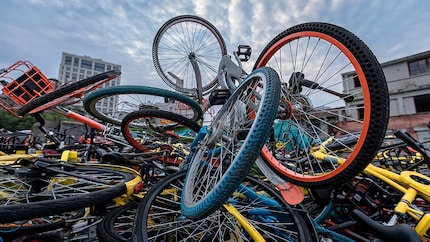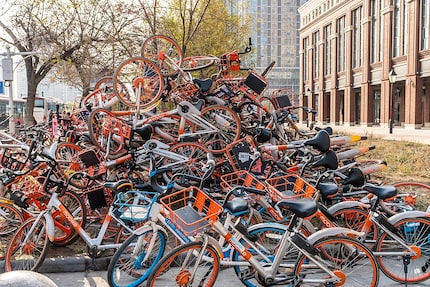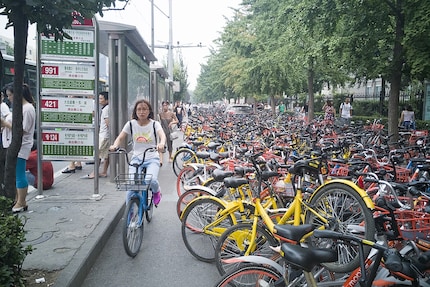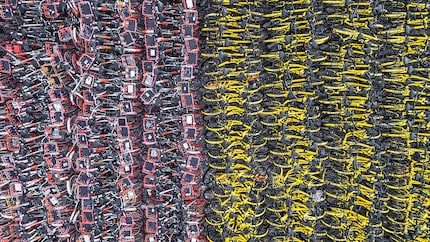
Background information
A visit to the manufacturer of Digitec charger plugs
by Simon Balissat

Megacities the world over saw their salvation from eternal gridlock in Chinese bike sharing providers. Alas, a new even larger chaos was spawned. What's interesting: there's a striking similarity between these failed mechanisms and the algorithms used by Silicon Valley internet titans.
This article was originally going to be about the logistics of bike sharing systems. How do providers manage to balance too many bikes in one area with too few in another? This was the kind of question I wanted to answer.
However, images such as this one make one thing blatantly clear: some distribution algorithms obviously still need some work.

Here's another relevant question: what's not working – and why isn't it?
Most original sharing systems used stations. Under them, bikes could only be lent from and returned to designated locations, nowhere else. You can't drive directly to your destination, but you can get close. That's one of the main advantages of city bikes gone. Providers aren't very fun of parking stations either. Locations must be rented and «vandal-proof» docking stations built.
That's how the concept of station-free systems emerged. A bike is simply deposited wherever. An app locks and unlocks the nearest bike, which can be located using your phone's GPS.
This isn't just flexible: it allows for complete and utter anarchy. If you were occasionally angry at O-bikes in your path, rest assured: that's nothing compared to what was happening in China in 2017.

Those aren't cornfields. Those are bikes. The picture was taken by a drone close to Shanghai.
China has been a country of bikes for a long time. Even in 1986, 63 per cent of travel in Beijing was done by bike. There were 72 bikes for every 100 people, while driving cars had the same reputation as a truck driver. Still, China's nothing if not efficient. Today, there are 250 million cars in the country – seven years ago there were only half of that. The side-effects of this automobile explosion are known: a never before seen tidal wave of smog and a titanic chaos on the roads.
The government knew: this problem could definitely be lessened by getting people back onto bikes. State-funded bike stations were already launched back in 2007. But those few thousand bikes would remain a drop in an ocean. Chinese cities required more bikes. A lot more. Bikes without docks seemed to be the logical solution. This makes supplying an entire city with bikes much easier.
However, this doesn't explain why a gigantic wave bikes flooded cities in a short time. Mountains of bikes were stacked up to the skies.

Naturally, China isn't just good at catching up when it comes to cars. For a while now, China has evolved out of being our planet's hardware factory. Earth's most populated country has birthed endless start-ups and several internet titans by now. And with these emerged an entire industry, similar to Silicon Valley. These mechanisms that allowed for millions of unused shared bikes are well-known. They're basically identical to how internet corporations from Silicon Valley work.
Google didn't just become an online giant thanks to its genius search functions. Offering as many useful free tools as possible has since become the corporation's recipe for success. Google Mail, Google Docs, Google Drive, Youtube, Picasa, Google Earth, Maps and Street View, just to name a few. Google would sometimes make catastrophic losses with Youtube: more than a million dollars a day. Growth, at any expense. The company's motto, even if it entails years of heavy losses.
An endless array of start-ups are trying to follow in Google's footsteps. With little success. After all, that's part of the business model – establishing a monopoly in a specific field by kicking out anyone else. Just what Chinese bike start-ups tried to do.
These providers didn't just flood cities with dirt-cheap bikes just because people needed them. They also did it to cut out the competition. To customers, the best company is the one they recognise on most street corners. Cheap and always available – sound familiar?
If your competition already has too many cheap bikes, there's only one thing for it: mass-produce some bikes and slash those prices. In China, short journeys are usually free. Even then, companies charge almost nothing, resulting in systems that would never be profitable. When rides only cost a few Rappen, breaking even on your bikes is simply impossible.
Due to these flooding tactics, when 2017 rolled around, Peking and Shanghai were home to so many bikes that cyclists could barely make their way through them.

To achieve growth without profit, start-ups require powerful and generous investors. This applies to both Chinese bike companies as well as Silicon Valley newbies. To investors, one truly magnificent idea can wipe out losses built up from tens if not hundreds of failed investments. Consequently, they tend to invest quite liberally.
This seems to be the case in China as well. For example, the start-up Mobike was able to get the investor Foxconn on board early. Later on, Mobike received 600 million dollars from Tencent, the Chinese tech giant that owns WeChat. Still, the new enterprise was in deep financial trouble, haemorrhaging up to 16 million Yuan a day. That's more than 2 million Swiss Francs. However, the online concern Meituan Dianping quickly bought up the start-up.
This way, Mobike was financially free to do what they wanted and willing to act even more aggressively. The result: deposits were no longer required when using their bikes. This way, Mobike entered the final arena of champions, one that only the toughest competitors even get to see. Between June and November 2017, bike sharing companies were going bankrupt left, right and centre. The fallen included Bluegogo, Wukong, Kuqi Bikes, Dingding Bikes and 3VBikes. Singapore's Obike followed in 2018. Without a doubt the largest providers, Ofo and Mobike, survived, having to give up on outward international expansion as a result. The game was to be played in China.
But why are investors pumping money into services that won't ever turn a profit? Probably because they're counting on other ways of making money in the end. Google and Facebook have proven this beyond a shadow of a doubt. Their user services are free, but money is still coming out of their ears – all by selling advertising space.
The most relevant factor here is again the sheer scope of things. Youtube accumulates billions of views per day. Ad space is sold in standard quantities: every 1000 views, clicks or using some similar yardstick. Even if they're dirt-cheap to buy, Youtube is still laughing its way to the bank. Established outlets with a much smaller reach can't compete, earning peanuts in comparison.
The second-biggest factor is data. Especially when combined with the first factor, size. The more data a platform has to work with, the more it can adjust its advertising. At least, this is what's promised to potential ad sellers.
Data collection seems to also have been what attracted investors to bike sharing. As bikes are fitted with GPS devices, data about driving habits can be collected. Bike sharing services could tempt city government with this data, for example: officials would then know where new roads for bikes are required. According to the «Zeit», this is exactly what O-Bike offered the city of Munich.
But analysts can gain much more from this data: where you stop and shop, where traffic lights can be improved, where accidents happen, where construction sites are, etc. Once you have the means to collect data, you'll be able to turn it into money eventually – this is what investors believe.
As we know, most countries are more lenient when it comes to their traffic laws than Switzerland – if not on paper, then in reality. A flood of bikes without docks can only be achieved if the state allows companies free reign. This isn't the case in Switzerland: Singaporean Obikes were quickly confiscated throughout many Swiss cities.
China also quickly tightened its regulations after the chaos grew out of control. More parking fines for bikes and a heavier reliance on busses, also when regarding bike sharing companies.
This harkens back to start-ups such as Uber or Airbnb. There are many regulations blocking conventional taxi and hotel companies, raising their prices. Be these spa taxes or mandatory insurance. Start-ups usually try to avoid these; according to them, they shouldn't belong to the above groups as they operate a different business model. Many of these questions go to court (all in German).
But what we do know is this: the less regulations the better the environment for «disruptive» start-ups. And for the longest time, travelling by bike in China wasn't regulated.

Loose regulations are a breeding ground for new ideas – or just missing infrastructure. Mobile payment services are also involved in bike sharing, a huge thing when it comes to China. In Switzerland, a country of banks, Maestro cards and contactless payment, there isn't much need for a mobile option. This is completely opposite in China, where most consumers constantly pay with their phones. This is the staging ground for the battle between WeChat and Alipay, owned by the two largest tech titans, Tencent and Alibaba. To them, bike sharing is a way to spread their payment scheme and possibly even diversify their provided services with movement data. Meituan Dianping, the owner of Mobike, is sponsored by Tencent while their main rival Ofo is bankrolled by Alibaba.
California's tech start-up scene is just as bitterly competitive as the one for Chinese bike providers. 8 or 9 out of ten start-ups need to pack it in after a few years, market analysts say. Success stories are often enjoyed and parroted, while no one ever remembers the multitude of failed ideas and companies. These days, just selling your own start-up to a large conglomerate is seen as a success.
Here's the largest and most blatant difference between Silicon Valley and Chinese bike start-ups: failed internet-based start-ups don't leave behind mountains of trash. Uber doesn't have its own cars; Airbnb doesn't rent out its own rooms. They see themselves purely as service providers.
Most failed ideas can be ignored without a second thought, as they don't leave behind anything tangible. Failing is even seen as a virtue: «fail fast, fail often», so goes the saying. Many a hair-brained idea has been justified by this quote. Investors usually don't care: they're extremely involved in keeping as many innovative and intelligent people in the start-up loop as possible.
These heaps of garbage are an impressive result of a market tactic we're very much used to. Still, it isn't without its absurdities.
My interest in IT and writing landed me in tech journalism early on (2000). I want to know how we can use technology without being used. Outside of the office, I’m a keen musician who makes up for lacking talent with excessive enthusiasm.
Interesting facts about products, behind-the-scenes looks at manufacturers and deep-dives on interesting people.
Show all